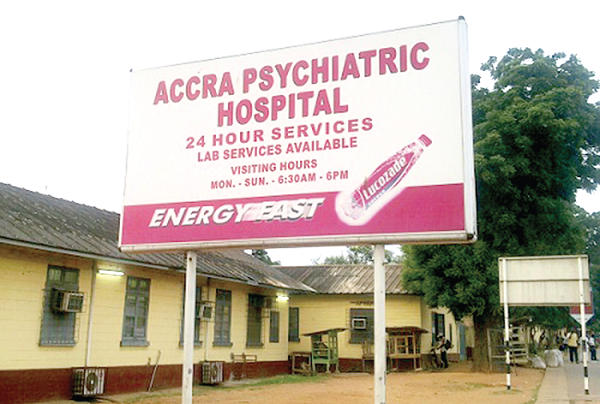
250 mentally ill in ‘detention’
Two hundred and fifty mentally ill patients have been abandoned by their relations for many years at the Accra Psychiatric Hospital (APH).
The neglected in-patients, who constitute more than half of the total population of inmates at the facility, include both male and female adults with a few children who are being catered for by the hospital authorities.
The situation is putting a lot of pressure on hospital authorities who have to usually squeeze scarce resources to provide for the well-being of the inmates, some of them having spent more than two decades.
The Medical Director of the hospital, Dr Pinaman Apau, expressed these concerns in an interview with The Mirror.
“We have about 400 to 450 in-patients here. Out of this number, we have about 250 vagrants who have been abandoned by their family members, and that has become our responsibility and a burden.
“So the hospital virtually takes care of everything for them including medication, clothing and feeding, and that is draining us well enough,” she said with much worry.
Meanwhile, the Chief Executive Officer (CEO) of the Mental Health Authority (MHA), Dr. Akwasi Osei, has said that it costs about GH₵5,000 to rehabilitate a mentally challenged person and re-integrate into society.
Such amount could only cover feeding, clothing, disinfectants and medication for only three months estimated rehabilitation period.
Tactics
Explaining to The Mirror how such persons got in there, Dr Apau said some of the family members usually brought the patients around for care, and left them there
On some occasions, she said, the Department of Social Welfare, the Police Service and other security agencies came to leave the patients there because they felt that it was the responsibility of the hospital, even when they did not have the capacity.
“The Social Welfare responsible for caring for these children come to dump some of them here because of stigmatisation and the fact that they are also under resourced to cater for them,” she said.
Recounting some of her experiences, Dr Apau indicated that sometime ago, a parent came to leave her 12-year-old child who was suffering from mental illness at the facility and left a note that she was fed up.
This clearly defeats the United Nations Sustainable Development Goal (SDG) three that seeks to ensure healthy lives and promote well-being for all at all ages.
“Sometimes the parents or relatives bring them here for treatment and promise to come back after they are admitted, and they never show up again,” she noted.
She emphasised that the situation persisted because society perceived mental illness as a curse and stigmatised the patients, but the hospital could not continue on that path because it was battling with a lot of challenges.
Assistance
Under the circumstances, Dr Apau called for support from the public and all stakeholders to help the hospital deal with the situation since it could not release the inmates “onto the streets” because they did not have anywhere to go.
She further called on the government to also settle the hospital’s debtors who were constantly on the heels of the management, failure of which could grind its activities to a halt.
Ghana’s Mental Health care
Ghana has not paid particular attention to mental health care over the years even though the Mental Health Act (Act 846) has been passed six years ago.
This is evidenced in the numerous challenges the major mental health facilities, such as the APH, and Pantang Psychiatric Hospital are facing . These challenges include debts, poor infrastructure and stigmatisation.
Suppliers, for instance, are always at the throat of management of these facilities due to old debts.
Dr Osei is reported to have said last year that about four million of Ghana’s current population of 28 million are suffering from mild to severe mental illness.
